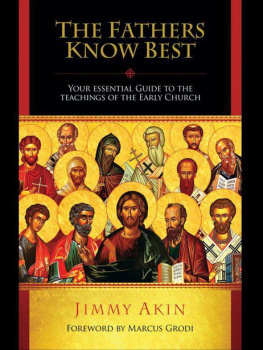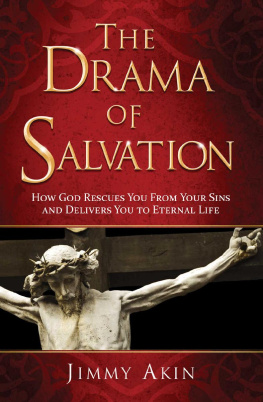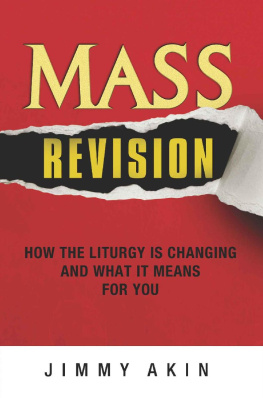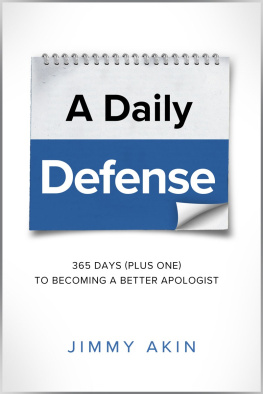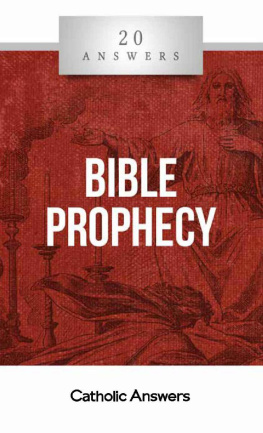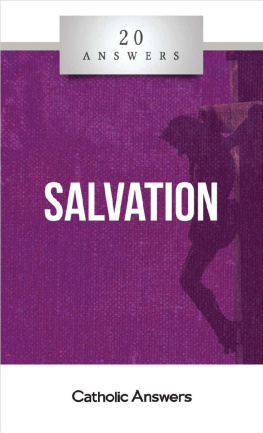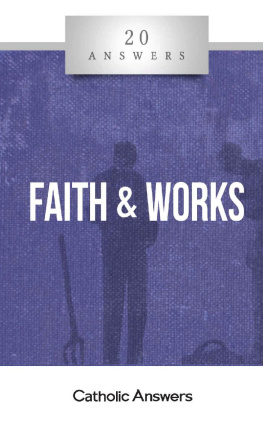Jimmy Akin - 20 Answers: Anti-Catholic Myths
Here you can read online Jimmy Akin - 20 Answers: Anti-Catholic Myths full text of the book (entire story) in english for free. Download pdf and epub, get meaning, cover and reviews about this ebook. year: 2021, publisher: Catholic Answers Press, genre: Religion. Description of the work, (preface) as well as reviews are available. Best literature library LitArk.com created for fans of good reading and offers a wide selection of genres:
Romance novel
Science fiction
Adventure
Detective
Science
History
Home and family
Prose
Art
Politics
Computer
Non-fiction
Religion
Business
Children
Humor
Choose a favorite category and find really read worthwhile books. Enjoy immersion in the world of imagination, feel the emotions of the characters or learn something new for yourself, make an fascinating discovery.

- Book:20 Answers: Anti-Catholic Myths
- Author:
- Publisher:Catholic Answers Press
- Genre:
- Year:2021
- Rating:5 / 5
- Favourites:Add to favourites
- Your mark:
- 100
- 1
- 2
- 3
- 4
- 5
20 Answers: Anti-Catholic Myths: summary, description and annotation
We offer to read an annotation, description, summary or preface (depends on what the author of the book "20 Answers: Anti-Catholic Myths" wrote himself). If you haven't found the necessary information about the book — write in the comments, we will try to find it.
20 Answers: Anti-Catholic Myths — read online for free the complete book (whole text) full work
Below is the text of the book, divided by pages. System saving the place of the last page read, allows you to conveniently read the book "20 Answers: Anti-Catholic Myths" online for free, without having to search again every time where you left off. Put a bookmark, and you can go to the page where you finished reading at any time.
Font size:
Interval:
Bookmark:
20 Answers
g
Anti-Catholic Myths
Jimmy Akin

20 Answers: Anti-Catholic Myths
Jimmy Akin
2021 Catholic Answers
All rights reserved. Except for quotations, no part of this book may be reproduced or transmitted in any form or by any means, electronic or mechanical, including photocopying, recording, uploading to the internet, or by any information storage and retrieval system, without written permission from the publisher.
Published by Catholic Answers, Inc.
2020 Gillespie Way
El Cajon, California 92020
1-888-291-8000 orders
619-387-0042 fax
catholic.com
Printed in the United States of America
978-1-68357-242-8
978-1-68357-243-5 Kindle
978-1-68357-244-2 ePub
Introduction
Everybodys a critic. So holds a common saying, and its certainly true that there is a lot of criticism in our world today!
Christians, in particular, can expect to be criticized. As Jesus said in the Sermon on the Mount, Blessed are you when men revile you and persecute you and utter all kinds of evil against you falsely on my account. Rejoice and be glad, for your reward is great in heaven, for so men persecuted the prophets who were before you (Matt. 5:1112).
He also told his disciples, If you were of the world, the world would love its own; but because you are not of the world, but I chose you out of the world, therefore the world hates you (John 15:19).
Knowing this, Christians can expect to be confronted by misunderstandings, hostility, and lies. Over time, all of these can combine to produce myths popular, enduring ideas that arent true.
This is true for Christians in general, and its true for Catholics in a particular way. This is partly because of the divisions that have sprung up in the Christian community. Although Jesus prayed that all of his disciples be one (John 17:2023), the devil has been able to divide Christians against each other.
In the years since the Protestant Reformation, the number of anti- Catholic myths has grown substantially. And although we should be thankful that the post-Reformation passions have cooled and many Christians are seeking reconciliation, the myths are still a problem.
In this short work, we will seek to dispel some of the most common anti-Catholic myths and show how you can deal with others. In the first part we will focus on myths about Catholic history and in the second part on myths about Catholic doctrine.
1.Constantine created the Catholic Church!
Its well known that the Catholic Church claims to have been founded by Jesus Christ. During his earthly ministry, he told St. Peter, You are Peter, and on this rock I will build my church, and the gates of Hades will not prevail against it (Matt. 16:18). Ever since, the popesas the successors of Peterhave guided the Catholic Church.
This means that if you want to claim that the Catholic Church is not Jesus Church, you need an alternative account of where it came from. You need to find some point in historyother than the ministry of Jesuswhere you think it started.
In order to dispute the Churchs claim to being founded by Christ and, often, to suggest that Catholicism was a Roman corruption of original, pure Christianity, some in the Protestant community have claimed that the Catholic Church actually came into existence in the early 300s and that it was founded by the emperor Constantine. Its also claimed that he made this new Catholicism the state religion.
Neither of these is true.
Constantine was born around A.D. 272, and he died in 337. He was raised as a pagan, but eventually he became Christian. Its often claimed that he was the first Christian emperor, but there is some doubt about this.
When he was in his thirties, Constantine witnessed the persecution unleashed by the emperor Diocletianthe last and bloodiest persecution of the Church by the Roman Empire. Despite the horrors being inflicted on Christians, Constantine was converted.
At the time, the empires government was confused, and a series of civil wars were underway. Constantine was in conflict with a man named Maxentius for control of Rome, and a climactic battleknown as the Battle of the Milvian Bridgewas approaching.
Before the battle, in which Constantine was greatly outmatched, he prayed to the Christian God and had a vision of a cross in the sky, along with the message In this sign, conquer. He also had a dream instructing him to use this sign, and he placed it on the shields of his soldiers.
The particular form of the sign he saw was known as the chi-rho , after the first to letters of the word Christ in Greek ( christos ). Chi looks like the English letter X, and rho looks like the English letter P, so the chi-rho combines these two shapes ( ), to form what has become a common Christian emblem.
Constantine won the Battle of the Milvian Bridge and eventually became the sole emperor. But although he favored Christianity, he did not make it the official religion. That did not happen until decades after Constantines reign.
In no sense, either, did Constantine found the Catholic Church. After he had his vision and dream, he took instruction in the Christian faith and eventually was baptized. He was joining a Church that already existed and that was already called the Catholic Church.
In fact, people had been referring to it that way since the end of the first century. We know that because, around A.D. 108, we find St. Ignatius of Antioch using the term in his letters: Wherever the bishop appears, there let the congregation be; just as wherever Jesus Christ is, there is the Catholic Church.
Ignatius doesnt bother to explain what he means by the term Catholic Church , which suggests that it was already in common use. That which would place its origin at least a few years earlier, in the late first century.
The term Catholic (Greek, katholik ) roughly means universal, and the term had been applied to the Church because of local factions that were beginning to break away from it in different areas. There needed to be a way to refer to the one Church that Christ founded, distinct from the breakaway factions, and so people called it the Catholic Church.
The Catholic Church thus was not established by the emperor Constantine. It was around long before his time. He didnt found it. He joined it.
2.The Catholic Church changed the Sabbath!
Observe the sabbath day, to keep it holy, as the Lord your God commanded you. Six days you shall labor, and do all your work; but the seventh day is a sabbath to the Lord your God; in it you shall not do any work.... You shall remember that you were a servant in the land of Egypt, and the Lord your God brought you out from there with a mighty hand and an outstretched arm; therefore, the Lord your God commanded you to keep the sabbath day (Deut. 5:1215).
So says one of the Ten Commandments. Today, however, almost all Christians keep Sundaythe first day of the weekas a holy day, rather than Saturday, the seventh.
Some Christians think this is a mistake and hold that we should treat Saturday as the weekly day of worship. Notable among these are the Seventh Day Baptists, who were founded in the 1600s, and the Seventh-day Adventists, who were founded in the 1800s.
So, why do most Christians worship on Sunday rather than Saturday? To explain this, seventh-day Christians often blame the Catholic Church. They assert that the Church changed the Sabbath. As to when this occurred, they will sometimes argue that it happened in the time of Constantine or at some other point after the apostolic age.
They sometimes claim that this represents an element of paganismthat Sunday is the day of the sun, and so worshiping on Sunday involves sun worship. Some even claim that Sunday worship isor will becomethe mark of the beast.
Next pageFont size:
Interval:
Bookmark:
Similar books «20 Answers: Anti-Catholic Myths»
Look at similar books to 20 Answers: Anti-Catholic Myths. We have selected literature similar in name and meaning in the hope of providing readers with more options to find new, interesting, not yet read works.
Discussion, reviews of the book 20 Answers: Anti-Catholic Myths and just readers' own opinions. Leave your comments, write what you think about the work, its meaning or the main characters. Specify what exactly you liked and what you didn't like, and why you think so.

